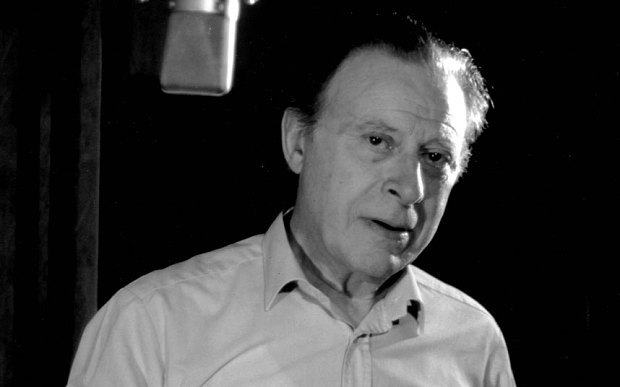We have recently lost our good friend and talented actor, Robert Rietti at the age of 92. The Telegraph have published an obituary, which we bring here in full.
May you rest in peace Robert, you will always be in our hearts!
***
Actor known as 'The Man of a Thousand Voices' whose fruity tones dubbed the dialogue of scores of stars
***
Robert Rietti, who has died aged 92, was an actor known as "The Man of a Thousand Voices" and "King of the Dubs".
There was a time when his deep and fruity tones could be heard at the cinema almost every time an actor playing a character with a foreign name appeared on screen, whether he was a James Bond villain, Napoleon Bonaparte or an Italian gangster. When the shark-loving Emilio Largo (played by Adolfo Celi) in Thunderball (1965) utters the words "Every man has his passion - mine is fishing. What is yours, Mr Bond?", it is Rietti's voice that is heard. He could even emulate the plummy tones of an upper-class British gent, as he did in Waterloo (1970) for Jack Hawkins, who had had surgery for throat cancer, and for the character of John Strangways, MI6's man in Jamaica in Dr No (1962).
His work was mostly uncredited, but in Waterloo he provided the voices of a total of 98 different people, while in the Agatha Christie film And Then There Were None (1974) he ended up having conversations with himself. He worked on a total of eight Bond films, also directing the post-production synching (adding the dubbed soundtrack to the film), and dubbed Jack Hawkins in his last 10 films. For his work as sound editor on the gangster movie Once Upon a Time in America (1984) Rietti was nominated for a Golden Reel Award.
He was born Lucio Herbert Rietti into a Jewish family in Paddington, west London, on February 8 1923. His father, Vittorio Rietti, was a distinguished actor and director who had moved to Britain from Ferrara in Italy, where members of the family had lived since the 13th century. One of his ancestors was physician to a pope and is said to have carried out the first known blood transfusion on the pontiff. Members of the family had also come to Britain in the early 19th century: the grandmother of Benjamin Disraeli was one Rebecca Rietti.
From an early age young Lucio wanted to follow his father on to the stage. As a child he created a theatre in the family garage where he put on entertainments for friends. In 1932, at the age of nine, he joined his father's theatre company under the name Bobby Rietti and impressed the critics as Poor Joe in an adaptation of Dickens's Bleak House on the London stage. "Bobby Rietti was heart-rending," wrote one. "I do not know any actor... who has one quarter of Rietti's pathos. If any actor over 20 can play Joe and make me cry as Bobby Rietti did, I will pay for him to rent the Palladium for one afternoon."
He made his screen debut as the page boy Fattorino in the Monty Banks comedy Heads We Go (1933) and appeared in several more films during the 1930s, including as an "aristocrat boy" in The Scarlet Pimpernel (1934), alongside Leslie Howard, Merle Oberon, and Raymond Massey. In 1935 he co-starred in the British film of Emil and the Detectives as "The Professor", the leader of a team of juvenile sleuths.
Both he and his father encountered prejudice, however, due to their foreign origins, and in the late 1930s the pair decided to try their luck in Italy, where Robert was offered a scholarship to the Italian Academy. With fascism in full swing, however, the award was withdrawn when it became known that he was Jewish, and father and son were forced to retire from one show after the audience began hurling anti-Semitic insults.
Returning to Britain, at the outbreak of the Second World War Robert, his brother and father were interned as enemy aliens. Robert suffering the indignity of being dragged into custody by the police during a rehearsal at Colchester Rep. He was interned for five months in a Liverpool prison, where he was set upon by fellow internees, members of the British Union of Fascists, and was saved from serious injury by the intervention of members of an Italian razor gang.
After his release Rietti joined the Rifle Brigade but ended up in the "Stars in Battledress" group, entertaining troops in Europe. He also appeared in a production of Hamlet with John Gielgud, staged for troops serving in the Far East.
His career as a child performer led to postwar work as a screen actor, and he made credited appearances (usually billed as the less Italian-looking Robert Rietty), mostly in character roles, in a number of films, among them Call of the Blood (1949); The Italian Job (1969); Sunday Bloody Sunday (1971); The Omen (1976) and Hannibal (2001). He also made guest appearances on television series such as The Avengers. But it was as a dubbing and radio performer that he became best known.
He worked with Orson Welles on his US Forces Radio series The Third Man (1951) and The Black Museum (1952), the first two of many collaborations with the actor, whose voice he would also dub (as Long John Silver) in the film Treasure Island (1972). He was a regular on the radio series Horatio Hornblower (1952) with Michael Redgrave, The Scarlet Pimpernel (1952), Sherlock Holmes (1954) with John Gielgud and Ralph Richardson, and Theatre Royal (1954) with Laurence Olivier. For several years he recorded a weekly programme from the BBC to the United States - the equivalent of Alistair Cooke's Letter from America.
In addition to dubbing the voices of "foreign" film characters, during the 1960s Rietti became busily employed dubbing for foreign actors in English language films with an international cast, such as Lawrence of Arabia (1962) and El Cid (1961). As well as providing the voices for James Bond characters, including the Japanese secret service chief Tiger Tanaka in You Only Live Twice (1967) and Ernst Stavro Blofeld in the villain's brief outing in For Your Eyes Only (1981), he dubbed Gregory Peck's German dialogue in Guns of Navarone (1961) and was brought in to re-record some of Christopher Plummer's speeches in The Royal Hunt of the Sun (1969), after American cinemagoers complained that they were incomprehensible, Plummer having refused to do so. In 1979 he re-recorded all Robert Shaw's dialogue in Avalanche Express after the star's death, when the original recording turned out to be unusable.
Rietti was a prominent member of the Orthodox Jewish community in London. In the 1970s he was a regular on Michael Freedland's radio show, You Don't Have To Be Jewish (BBC Radio London, later LBC). In 2004 he broadcast A Rose for Reuben (BBC Radio 4), a series about individual survivors of the Holocaust which led to the publication of his book of the same name in 2006. In 2010 he published his autobiography, A Forehead Pressed Against a Window.
Rietti translated and adapted Italian plays into English, including the works of Pirandello, and was awarded a knighthood by the Italian government. In 2000 he was nominated for a Bafta special award for outstanding work.
Rietti's wife Tina predeceased him. He is survived by their two sons, one of whom is an Orthodox rabbi, and two daughters.
Robert Rietti, born February 8 1923, died April 3 2015
***
Click here for the article on Telegraph's website: http://goo.gl/ie9GBP




